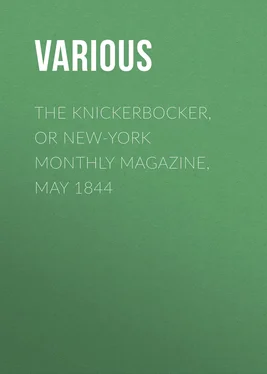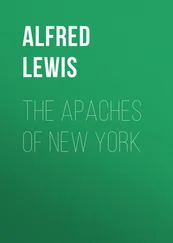Various - The Knickerbocker, or New-York Monthly Magazine, May 1844
Здесь есть возможность читать онлайн «Various - The Knickerbocker, or New-York Monthly Magazine, May 1844» — ознакомительный отрывок электронной книги совершенно бесплатно, а после прочтения отрывка купить полную версию. В некоторых случаях можно слушать аудио, скачать через торрент в формате fb2 и присутствует краткое содержание. Жанр: foreign_antique, periodic, foreign_edu, на английском языке. Описание произведения, (предисловие) а так же отзывы посетителей доступны на портале библиотеки ЛибКат.
- Название:The Knickerbocker, or New-York Monthly Magazine, May 1844
- Автор:
- Жанр:
- Год:неизвестен
- ISBN:нет данных
- Рейтинг книги:4 / 5. Голосов: 1
-
Избранное:Добавить в избранное
- Отзывы:
-
Ваша оценка:
- 80
- 1
- 2
- 3
- 4
- 5
The Knickerbocker, or New-York Monthly Magazine, May 1844: краткое содержание, описание и аннотация
Предлагаем к чтению аннотацию, описание, краткое содержание или предисловие (зависит от того, что написал сам автор книги «The Knickerbocker, or New-York Monthly Magazine, May 1844»). Если вы не нашли необходимую информацию о книге — напишите в комментариях, мы постараемся отыскать её.
The Knickerbocker, or New-York Monthly Magazine, May 1844 — читать онлайн ознакомительный отрывок
Ниже представлен текст книги, разбитый по страницам. Система сохранения места последней прочитанной страницы, позволяет с удобством читать онлайн бесплатно книгу «The Knickerbocker, or New-York Monthly Magazine, May 1844», без необходимости каждый раз заново искать на чём Вы остановились. Поставьте закладку, и сможете в любой момент перейти на страницу, на которой закончили чтение.
Интервал:
Закладка:
The Duke of Weimar told his friends always to be of courage; this Napoleonism was unjust, a falsehood, and could not last. It is true doctrine. The heavier this Napoleon trampled on the world, holding it tyrannously down, the fiercer would the world’s recoil against him be, one day. Injustice pays itself with frightful compound interest. I am not sure but he had better lost his best park of artillery, or had his best regiment drowned in the sea, than shot that poor German bookseller, Palm! It was a palpable, tyrannous, murderous injustice, which no man, let him paint an inch thick, could make out to be other. It burnt deep into the hearts of men, it and the like of it; suppressed fire flashed in the eyes of men, as they thought of it, waiting their day! Which day came : Germany rose round him. What Napoleon did will amount in the long run to what he did justly ; what Nature with her laws will sanction. To what of reality was in him; to that and nothing more. The rest was all smoke and waste. La carrière ouverte aux talens: that great true message, which has yet to articulate and fulfil itself every where, he left in a most inarticulate state. He was a great ébauche , rude-draught; as indeed what great man is not? Left in too rude a state, alas!
His notions of the world, as he expresses them there at St. Helena, are almost tragical to consider. He seems to feel the most unaffected surprise that it has all gone so; that he is flung out on the rock here, and the world is still moving on its axis. France is great, and all great; and at bottom, he is France. England itself he says is by nature only an appendage of France; ‘another isle of Oberon to France.’ So it was by nature , by Napoleon-nature; and yet look how in fact—here am I! He cannot understand it; that France was not all great, that he was not France. ‘Strong delusion,’ that he should believe the thing to be which is not! The compact, clear-seeing, decisive Italian nature of him, strong, genuine, which he once had, has enveloped itself, half dissolved itself, in a turbid atmosphere of French fanfaronade. The world was not disposed to be trodden down under foot; to be bound into masses, and built together as he liked, for a pedestal for France and him: the world has quite other purposes in view! Napoleon’s astonishment is extreme. But alas, what help now! He had gone that way of his; and Nature had also gone her way. Having once parted with reality, he tumbles helpless in vacuity; no rescue for him. He had to sink there mournfully as man seldom did; and break his great heart and die—this poor Napoleon; a great implement too soon wasted, till it was useless; our last Great Man!
THE FLORAL RESURRECTION
Welcome, sweet flowers! bright Summer’s poetry!
I hail your fragrant coming, and again
With joy I read your brilliant imagery
Written once more in nature’s holiest strain:
The lowly cottage, and the princely hall
Your advent cherisheth—ye are all to all.
Rising in glory from their winter graves,
The painted Tulip comes, and Daisy fair,
And o’er the brook the fond Narcissus waves
Her golden cup—her image loving there.
Those early flowers their glowing tributes bring
To weave a chaplet round the brow of Spring.
The sultry sun of June looks down, and then
Comes forth the lovely rose, the garden’s pride,
To herald summer over glade and glen,
O’er wild and waste, o’er mead and mountain side:
Proudly she rears her crest on high, the vain
And gay pursuivant of a brilliant train.
And now, bright Dahlia, heartless one, appear!
Thy time has come to join the festival:
Come, Peru’s daughter, belle of night! dost fear
To wear in glorious day thy coronal?
And thou, pale exile from the holy land,
Imperial Lily! come and join the band!
See, o’er the lattice creeps the Eglantine,
And there the Jasmine clambers up the wall
To twine her wreaths with Flora’s blushing queen,
Rejoicing all in summer’s carnival:
How kind of them to deck the shepherd’s cot,
And with their presence cheer his humble lot!
I love ye, flowers; your odors ever bring
Back visions of the past: I love ye well;
From the lone Primrose, nursling of the Spring,
Unto the beauteous Aster, Autumn’s belle,
Or reared on verdant field, or ruined wall,
I love ye all, sweet flowers!—I love ye all!
THE LEGEND OF DON RODERICK
The scattered fugitives of the Christian army spread terror throughout the land. The inhabitants of the towns and villages gathered around them as they applied at their gates for food, or laid themselves down, faint and wounded, beside the public fountains. When they related the tale of their defeat, old men shook their heads and groaned, and the women uttered cries and lamentations. So strange and unlooked-for a calamity filled them with consternation and despair; for it was long since the alarm of war had sounded in their land: and this was a warfare that carried chains and slavery, and all kinds of horrors, in its train.
Don Roderick was seated with his beauteous queen, Exilona, in the royal palace which crowned the rocky summit of Toledo, when the bearer of ill-tidings came galloping over the bridge of the Tagus. ‘What tidings from the army?’ demanded the king, as the panting messenger was brought into his presence. ‘Tidings of great wo!’ exclaimed the soldier. ‘The prince has fallen in battle. I saw his head and surcoat upon a Moorish lance; and the army was overthrown and fled!’
At hearing these words, Roderick covered his face with his hands, and for some time sat in silence; and all his courtiers stood mute and aghast, and no one dared to speak a word. In that awful space of time passed before his thoughts all his errors and his crimes, and all the evil that had been predicted in the necromantic tower. His mind was filled with horror and confusion, for the hour of his destruction seemed at hand: but he subdued his agitation by his strong and haughty spirit; and, when he uncovered his face, no one could read on his brow the trouble and agony of his heart. Still, every hour brought fresh tidings of disaster. Messenger after messenger came spurring into the city, distracting it with new alarms. The infidels, they said, were strengthening themselves in the land; host after host were pouring in from Africa: the sea-coast of Andalusia glittered with spears and scimitars. Bands of turbaned horsemen had overrun the plains of Sidonia, even to the banks of the Guadiana. Fields were laid waste, towns and cities plundered, the inhabitants carried into captivity, and the whole country lay in smoking desolation.
Roderick heard all these tidings with an undaunted aspect; nor did he ever again betray sign of consternation: but the anxiety of his soul was evident in his warlike preparations. He issued orders that every noble and prelate of his kingdom should put himself at the head of his retainers, and take the field; and that every man capable of bearing arms should hasten to his standard, bringing whatever horse, and mule, and weapon he possessed: and he appointed the plain of Cordova for the place where the army was to assemble. Throwing by, then, all the trappings of his late slothful and voluptuous life, and arming himself for warlike action, he departed from Toledo at the head of his guard, composed of the flower of the youthful nobility. His queen, Exilona, accompanied him; for she craved permission to remain in one of the cities of Andalusia, that she might be near her lord in this time of peril.
Читать дальшеИнтервал:
Закладка:
Похожие книги на «The Knickerbocker, or New-York Monthly Magazine, May 1844»
Представляем Вашему вниманию похожие книги на «The Knickerbocker, or New-York Monthly Magazine, May 1844» списком для выбора. Мы отобрали схожую по названию и смыслу литературу в надежде предоставить читателям больше вариантов отыскать новые, интересные, ещё непрочитанные произведения.
Обсуждение, отзывы о книге «The Knickerbocker, or New-York Monthly Magazine, May 1844» и просто собственные мнения читателей. Оставьте ваши комментарии, напишите, что Вы думаете о произведении, его смысле или главных героях. Укажите что конкретно понравилось, а что нет, и почему Вы так считаете.












